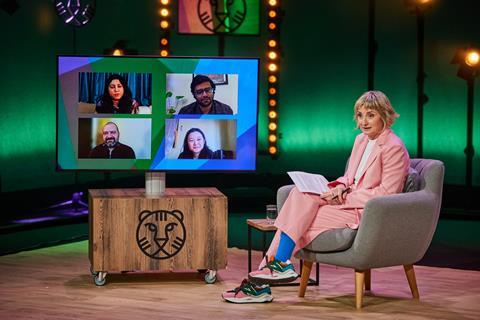
IDFA artistic director Orwa Nyrabia spoke virtually with three filmmakers at the International Film Festival Rotterdam (IFFR) to underline the increasing importance of festivals as spaces for political debate.
Nyrabia was joined by US-based artist, programmer and researcher Abby Sun, and Indian filmmakers Pooja Shetty and Neil Pagedar. They urged festivals to remain flexible as the industry changes.
“[A festival is] about more than just showing a film,” said Nyrabia, who is also a producer and filmmaker. It is about “what needs to be brought to audiences that is particular to here, and about what you believe to be relevant today that’s a bit subversive”.
Pagedar said: “Festivals are becoming increasingly sacred in our community. They are becoming places where you talk about politics and economics of different countries.”
“Rotterdam has a strong history supporting Asian work so this is where I go to learn about new works and art from my region,” said Sun, calling festival attendance “an opportunity to participate in the development of the political economy of filmmaking.”
The speakers were participating in a panel on Sunday (January 30) titled ‘Pro Dialogues #2: Festival futures: de-construct to re-construct’.
Flexibility and adaptability
With no clear indication of what the future may hold, festivals need to be “as light on their feet as possible,” said Shetty. She asserted that “mammoth structures” do not work and the “only winners that will survive in this future are flexible and adaptable, constantly looking inwards and fixing the cracks as we go along.”
“A cyclist in India going round with a sheet and screening films for village residents is a film festival, with him in the role of curator,” she added.
The festival experience reflects that “humans are social animals,” said Pagedar. “We want to meet and experience things together. You watch a film with strangers and you are sharing empathy. It’s almost a holy experience.”
Yet festivals also have more grounded connotations. “It has to do with money, funding, and the marketplace,” said Nyrabia. “This commercial vocabulary comes across and leaves a measurable economic factor while taking away the immeasurable artistic value.”
This raises the issue of where the festival ends and the market begins, Nyrabia said, indicating this may be another matter that needs to be addressed in the future. “Film festivals need to catch up and adapt,” the artistic director added.
”We are constantly on the cusp of new identities, new technology,” Pagedar said. ”There is filming on cellphones, yet festivals shy away from all this.” Attention also needs to be paid to the promised democratization that in some instances is not coming through, said Sun, citing practises of geoblocking and preferential geolocation as examples.
However, Nyrabia said: “We cannot jump to conclusions as to what festivals will be in 10 years’ time. One of the lessons is to stop predicting. History grows in a way that never confirms the predictions.”
Nyrabia said the Covid-19 pandemic had shifted the prevailing balance of power and western societies were now having to learn to live with uncertainties and all that that implied. “The pandemic opens the door to ask those less fortunate of the world for advice,” he added. “This sense of insecurity is overwhelming, but most of the world has always lived with never knowing what will happen tomorrow.”

























No comments yet